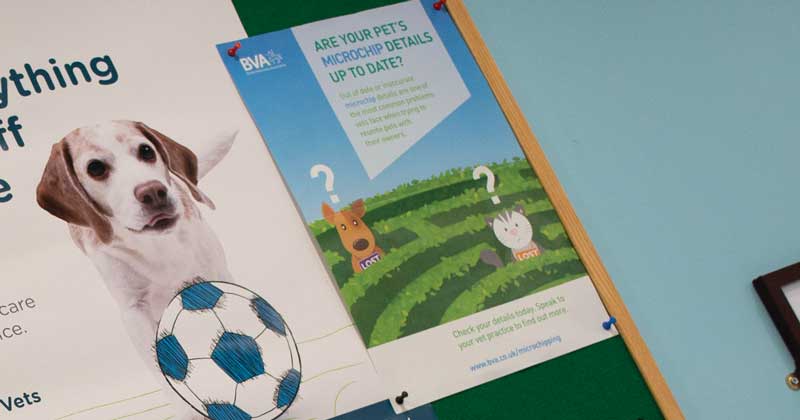1 Jun 2021
How microchipping can help achieve a premium bond with your clients
The coronavirus pandemic and subsequent national lockdowns sparked a pet-buying boom on an almost unprecedented scale. Microchipping can provide the perfect opportunity for your practice to bond with this potential army of new clients…

Image © Eva / Adobe Stock

Roughly 3.2 million households have acquired a pet since the start of the COVID-19 pandemic, and the UK has more than 12 million dogs and 12 million cats1.
This compares with the 10 million dogs and 11 million cats listed September 20192. That’s some increase.
Despite the fact that it’s compulsory by law for all dogs to be microchipped, the combination of so many new, inexperienced owners and practices forced to work under COVID-19 restrictions makes it likely that thousands of animals are not yet microchipped.
Given the numbers of animals that go missing every year, this is a serious welfare issue and a potential source of misery for their owners, as unchipped pets are much less likely to be found.
It’s also worth noting that, during lockdown, dog thefts have increased by almost a fifth, with up to seven pets being reported stolen each day in 2020. An estimated 2,438 dogs were reported as stolen in 2020 – a 19% increase from 2019. Only 22% of stolen dogs were reunited with their owners. Cat theft has tripled1.
As a vet practice, you are charged with protecting the welfare of your patients and, in so doing, supporting the well-being of their owners. With your business hat on, you should also be looking to secure the long-term, loyal and mutually beneficial relationships with clients that will form the bedrock for the successful growth of your practice. The good news is that a focus on microchipping as we start to emerge from COVID-19 restrictions could help you in achieving both.
Compulsory message
In 2020, 92% of dogs were microchipped, so the message that it is now compulsory is getting through3. However, with up to two million new dog owners in the UK – some of them first-time owners – they may need to be made aware of this requirement. A total of 74% of cats were microchipped in 20203.
As cats are more likely to roam, and with a million more of them now sharing our homes, cat owners new and old also need to understand the value of microchipping, especially as legislation may be on the way.
Before you embark on a campaign to encourage pet owners to contact you about microchipping, you might want to make some simple internal checks first:
- Review your microchip supplier and database company to ensure it is keeping up with advances in technology.
- For instance, does the database supplier offer pet owners multiple ways to contact them?
- Does it share lost pet information and offer location maps showing where a pet went missing or was stolen?
- Can this information be shared with WhatsApp contacts via other social platforms?
- Check that the database offers the chip checker tool required by Defra to indicate the database the pet is registered on and that the microchip supplier you are using is ISO-compliant.
- Make sure that you offer up-to-date educational resources to offer clients, setting out the benefits of microchipping and what the process involves. While clients aren’t able to visit the practice, flyers and social media posts are a good idea.
Educating owners
A number of points new owners should understand about microchipping exist, so it’s worth making sure the whole practice team is familiar with them:
- Over the past few years, a number of “database websites” that are not Defra compliant have been set up. They can look genuine and many owners are being hoodwinked into registering their pet’s microchip with them, rather than one of the reputable and long-established database providers. I’ve seen the devastation caused when a pet goes missing and its owner finds out that the database he or she signed up with cannot help.
- Pets should be registered on only one database, as it is more difficult to track down animals registered on multiple databases. This sounds a little counter-intuitive and owners who don’t understand the process may think that getting their pet registered on as many databases as possible is a good thing. Owners of pets registered on a Defra-compliant database will be alerted as to which database the chip is registered with.
- As we start to emerge from lockdown, the housing market is booming in many parts of the country, signalling that many of us are on the move. And this means our pets are on the move, too. Owners may need reminding of the crucial importance of updating the pet database service with new address details.
Importance
Promoting the importance of microchipping should be something the whole team does on a daily basis, and it’s always worth checking the microchip on every pet during its first visit. Not only will this confirm that the animal is chipped, it is also an excellent opportunity to check that the address details are correct – especially if it’s a new client visiting your practice for the first time. Given the increasing rates of pet theft, it’s also a useful security check.
In addition to talking to clients at every possible opportunity, you can also use your website, client newsletter and social channels to highlight the benefits of microchipping. Your supplier should be able to offer you engaging promotional resources to use. To reach those new owners who may not have visited the practice before, why not contact your local radio station or newspaper and offer an interview or article giving general advice to new pet owners, perhaps with a promotion, such as a free health check?

Opportunity
While microchipping, in itself, doesn’t offer huge financial reward to practices, the sheer number of additional dogs and cats in need of a microchip is significant and, of course, it will also improve pets’ welfare and give peace of mind to their owners.
If you can encourage owners to come to you for microchipping, you then have a great opportunity to discuss the other aspects of responsible pet ownership – vaccination, nutrition, parasite control – and even sign them up to your pet health plan.
It’s an opportunity worth taking.
Latest news

Livestock
Rising paromomycin resistance forces rethink in calf scours management
Sponsored
21 May 2025
